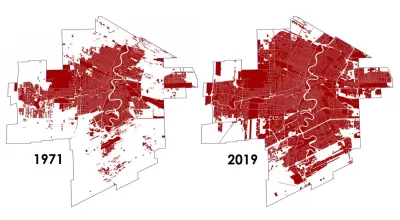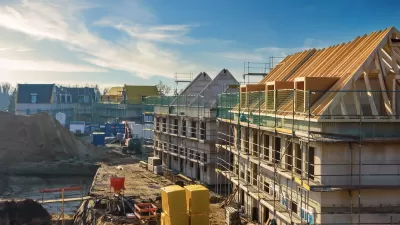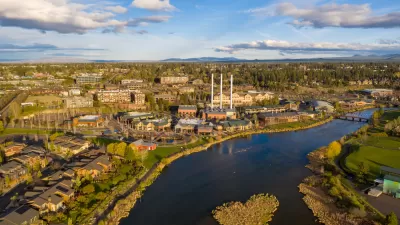Low density sprawl stretches the tax dollars of every resident. That fact could be used to support plans for more infill density, according to this article set in the city of Winnipeg, Manitoba.

"Planners at the City of Winnipeg are currently in the process of writing a residential infill strategy to guide new development in the city’s older neighbourhoods," according to a column by Brent Bellamy, creative director at Number Ten Architectural Group in Winnipeg.
The column makes one argument for why infill development would be a good thing for the city: sprawl costs too much.
A "jaw-dropping graphic" recently released by the city, compares the built-up area of Winnipeg in the 1970s to the Winnipeg of today. "In that time, the footprint of the city increased by 96 per cent, almost doubling, while the population increased by only 37 per cent. The conclusion was that the city is currently growing three times faster in area than it is in population," explains Bellamy.
That sprawl has economic repercussions, Bellamy writes: "Compared to 45 years ago, each individual Winnipegger is today responsible for the cost of maintaining almost 50 per cent more land area, and its corresponding services and infrastructure." Tax dollars stretched so far contributes to facts of life like potholes, rising taxes, and declining public service, according to Bellamy.
FULL STORY: City's expanding footprint has high cost

Alabama: Trump Terminates Settlements for Black Communities Harmed By Raw Sewage
Trump deemed the landmark civil rights agreement “illegal DEI and environmental justice policy.”

Study: Maui’s Plan to Convert Vacation Rentals to Long-Term Housing Could Cause Nearly $1 Billion Economic Loss
The plan would reduce visitor accommodation by 25% resulting in 1,900 jobs lost.

Planetizen Federal Action Tracker
A weekly monitor of how Trump’s orders and actions are impacting planners and planning in America.

Waymo Gets Permission to Map SF’s Market Street
If allowed to operate on the traffic-restricted street, Waymo’s autonomous taxis would have a leg up over ride-hailing competitors — and counter the city’s efforts to grow bike and pedestrian on the thoroughfare.

Parklet Symposium Highlights the Success of Shared Spaces
Parklets got a boost during the Covid-19 pandemic, when the concept was translated to outdoor dining programs that offered restaurants a lifeline during the shutdown.

Federal Homelessness Agency Places Entire Staff on Leave
The U.S. Interagency Council on Homelessness is the only federal agency dedicated to preventing and ending homelessness.
Urban Design for Planners 1: Software Tools
This six-course series explores essential urban design concepts using open source software and equips planners with the tools they need to participate fully in the urban design process.
Planning for Universal Design
Learn the tools for implementing Universal Design in planning regulations.
Caltrans
Smith Gee Studio
Institute for Housing and Urban Development Studies (IHS)
City of Grandview
Harvard GSD Executive Education
Toledo-Lucas County Plan Commissions
Salt Lake City
NYU Wagner Graduate School of Public Service





























